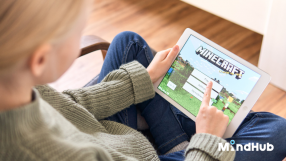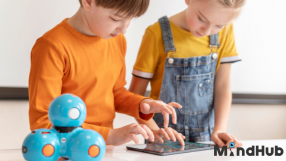
If we have to base it all on statistics, we will find impressive (for better or worse) facts about children and their time on the Internet.
One in three internet users is a child. 50% of the growing-ups use the Internet before the age of 7. Young people are the most active in searching for Internet content, but they are also the most vulnerable.
Statistics like these make us think about the safety of our children in the online space and whether they understand it well enough to know how to protect themselves in it.
According to a 2018 survey of 14,000 children in 400 schools in Greece, 83% of children in the country are on the Internet without parental supervision, 61% have watched online content of a violent or sexual nature, and 21% have been subjected to cyberbullying. In addition, online bullying rates in Greece are among the highest in Europe, with more than 40% of children and young people that became a victim to it.
Cyberbullying can occur on children's favorite social media, on messaging platforms (Viber, WhatsApp, etc.), as well as on other types of online platforms.
In order for children to know how to protect themselves, they need to know well the nature of the Internet and its purposes. That is why, at MindHub, we aim to help both you and your children.
What’s the Internet?
Simply put, the Internet is made of many networks, each involving different computers communicating with each other. The Internet is the common name not for specific hardware or machines but for the interaction between all computers, phones, tablets, and devices.
Thus, the Internet becomes an inexhaustible source of information, a means of communication, marketing, and advertising, a way of exchanging content, and endless access to a database of various kinds.
The Internet serves and connects billions of users around the world with a wide range - from private and public to academic, commercial, and government.
How does the Internet work and reach us?
The Internet connects computer networks in its global system via TCP/IP (Transmission Control Protocol / Internet Protocol) protocols. This is the "language" of the Internet and allows the connection of individual computers that are not of the same type.
Small LANs (local area networks) form a large one, connecting to each other and allowing people from different parts of the world to have the means to connect - no longer with just messages, but now also with video, audio, and many other interactive ways.
What can we use the Internet for?
As you know, the Internet allows unlimited access to a huge database - different content and different ways to communicate, inform, share and educate. We can safely say that the Internet has everything. The real challenge is not in finding information but in finding a truthful one.
If we look at the positive side of things and the advantages of the online space, then we can find not only information in it, we can also create it. We can share any kind of created content (graphic, illustrative, sound, text) we can publish or search indefinitely in time and space.
We can even use the Internet as a tool for any other media - we can watch TV online, read the latest news and listen to the latest music. We can communicate faster, easier, and more accessible than ever.
We can educate ourselves. To use the infinite access to information for ourselves, but also for our children, who can benefit from the interactive and easy-to-understand data presented on websites, through texts, videos, or sounds. And why not have fun? With educational and interesting games - that also is quite possible.
What do we not know about the Internet?
The Internet does not have a center to regulate the information shared and published online. This, on the one hand, gives users freedom, but on the other hand, limits the authenticity of the data.
This driving force in society is used by nearly 3.2 billion people! About 200 billion emails are sent per day (70% of which are spam), and 3 billion queries are made on Google.
It is also impressive that the biggest technology giants and successful companies involved in any technological development are created by students in their garages.
It will also not surprise us that the fastest growing product, faster than anything else that is made in the world, is computer programming. That is why the need for staff in the field is so urgent.
We at MindHub know how important it is to develop skills early to prepare children for the professions of the future, which is why we offer a variety of programming courses. From workshops to summer camps and courses for block and visual programming. Each course is specially created to be interactive, fun, and educational at the same time and to develop skills such as analytical skills, problem-solving ability, and quick to find solutions.
The most sought-after professions, the most evolving field, and the future of the Internet - in the basis of it all is computer programming, which MindHub accepts as its mission and works with children for their better future.
We are winding up with some tips and recommendations from MindHub for safe use of the Internet:
-
All accounts and platforms that you and your children use must have very strong passwords! Use numbers, symbols, and uppercase and lowercase letters to create them.
-
Don't share too much personal information online! Explain to your kids the consequences it might have.
-
Choose the information you read correctly. Learn to double-check content sources and compare them to others for authenticity.
-
Be careful with the apps you download and the sites you visit, as well as the emails you respond to.
Online space is an ocean that can contribute to a pleasant experience, but it also hides dangers, and to deal with them, you must rely on awareness and education.
MindHub offers a number of courses that prepare children on how to use the Internet to their advantage with the help of computer programs and languages.
Take a look at our start-up courses that can give the necessary boost to your child or give a chance to a demo lesson from the MindHub’s mentors!


